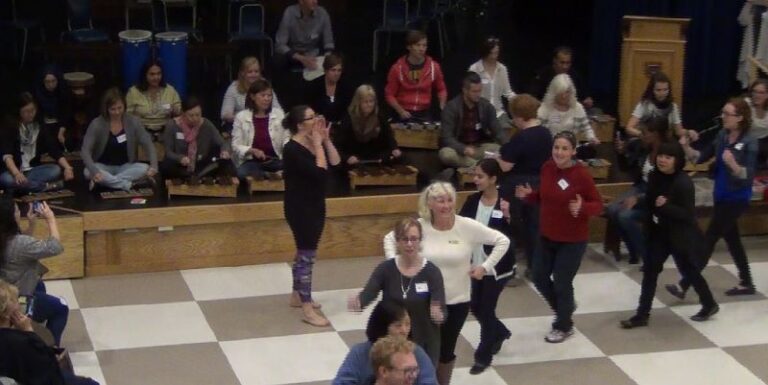Carl Orff Canada’s 5 Core Principles of Keetman/Orff Schulwerk


very phase of Schulwerk will always provide stimulation for new independent growth; it is never conclusive and settled, but always developing, always growing, always flowing ~ Carl Orff, 1963/2011
As The Schulwerk began to spread outside of Germany, Carl Orff and Gunild Keetman’s “wildflower” has become inspiration for new interpretations. While the roots remain true to the core principles, in new soil the growth represents the culture where it is transplanted. In its new home it explores and sustains the musics, languages, cultures, and communities of students and beyond.
- The Schulwerk is holistic music and movement education, engaging learners in a playful and creative manner. (Out of music, movement, out of movement, music. ~ Dorothee Günther, 1976/1978)
- The Schulwerk is focused on creative activities using improvisation and composition. Music making and dance emerge from improvisation through all phases of teaching. (Improvisation is the starting point for elemental music-making. ~Carl Orff, 1976/1978; The primary purpose of music education, as Orff sees it, is the development of a child’s creative faculty which manifests itself in the ability to improvise. ~ Arnold Walter, 1992)
- The Schulwerk is collaborative and social. Students engage, interact, and learn from each other. Collaboration is an integral part of a student’s development, allowing them to build empathy and appreciation for their peers, enhance interpersonal skills, and develop independence, critical thinking and problem solving.
- The Schulwerk is a carefully curated process involving play, imitation, exploration, discovery, creating, and reflecting. It is a recursive model; concepts “are developed, recombined, elaborated, and transformed across novel and varied contexts so that learning… becomes more sophisticated, more complex, deeper, and broader with time and new experiences and applications.” ~ Kindergarten to Grade 8 Music, Manitoba Curriculum Framework, 2021
- The Schulwerk is a multi-media approach, starting with the body. The voice, body percussion, movement, and a wide assortment of pitched instruments, including Orff barred instruments, and unpitched instruments are used as “equal, complementary and connected forms of expression.” ~ Wolfgang Hartman, 2021
Because the Schulwerk is a holistic, progressive and flexible pedagogy, it has aligned with many current and aspirational educational philosophies throughout its history. Equity, Diversity, and Inclusion are natural threads that weave throughout and enrich the Schulwerk. Pedagogy is built from and by the community in which it exists, changing as the community changes. Each part of the process and each person that participates is essential to the experience of the whole.
References
Günther, D. (1978). In C. Orff, The schulwerk (M. Murray, Trans.). Schott (Original work
published 1976).
Hartmann, W. (2021). Looking at the roots: A guide to understanding Orff schulwerk.
Pentatonic Press.
Manitoba Education and Early Learning. (2021). Kindergarten to Grade 8 Music
[Manitoba Curriculum Framework (2nd ed.)].
https://www.edu.gov.mb.ca/k12/cur/arts/docs/music_k8_2nd.pdf
Orff, C. (2011). Orff past and future (M. Murray, Trans.). In B. Hasselbach (Ed.), Texts
on theory and practice (pp 134-156). Schott (Original work published 1963)
Orff, C. (1978). The schulwerk (M. Murray, Trans.). Schott (Original work published
1976).
Walter, A. (1992). Elementary music education: The European approach. In D. Hall
(Ed.), Orff Schulwerk in Canada, pp 4-11. Schott.